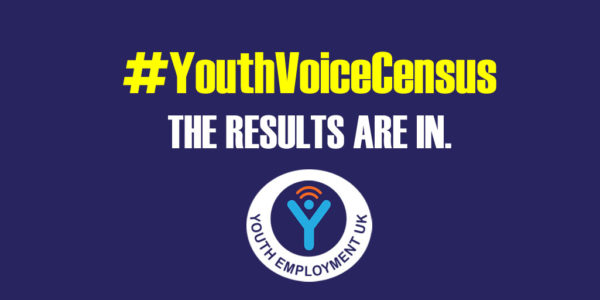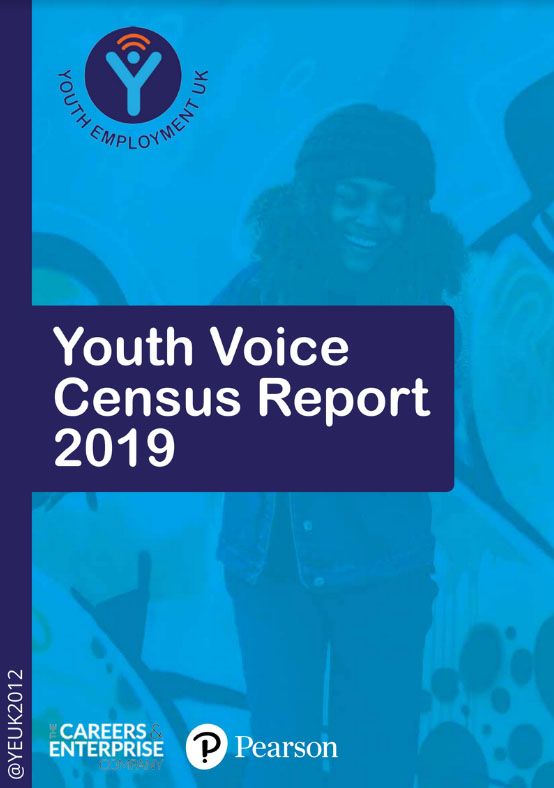Careers education and knowledge of apprenticeships is on the rise, but there is still much work to do to fix youth unemployment.
Youth Employment UK has today launched the results from the 2019 Youth Voice Census, a survey capturing the experiences of more than 3,000 14-24-year olds as they transition between education and employment.
Young people and careers education
Young people are benefitting from developments in careers education policy and knowledge of apprenticeships is on the rise; 83% of respondents reported that they had had apprenticeships discussed with them whilst in secondary school, up from 58% in 2018. However university remains the option most frequently discussed, and young people’s confidence in pursuing an apprenticeship has some way to go before we see real parity. It is encouraging to see that those young people who do undertake an apprenticeship report high satisfaction levels. More than 83% say that their apprenticeship has prepared them for their next step, with 63% of respondents planning to stay with their current employer.
Careers education and the gender divide
There are, however, signs that gender affects the experiences young people are having. Young women are more likely to have traditional academic routes discussed with them over alternatives, and young men are more likely to have support to pursue vocational routes as well as receiving more careers support generally. Another stark difference is that young women are more positive about the services they receive whilst in education, but as they transition into employment they are less likely to feel happy or fulfilled. This is in contrast to young men who grow in confidence and satisfaction as they leave education.
Young people, career confidence and mental health
Young people fear their mental health, where they live, experience and a ‘lack of jobs’ will prevent them from finding work.
Mental health has been identified as one of the four key barriers young people feel that they face as they transition into work. Alongside mental health, other key challenges cited include location/travel, a perception that there are not enough jobs, and a lack of experience.
- 50% of young people are not confident that they will move into meaningful work.
- 69% of young people do not think that employers are supportive of hiring young people.
- 48% of young people were not offered work experience in secondary school.
Urgent action required in an uncertain youth employment landscape
The youth employment landscape has always been complex; nearly 800,000 young people today are not in education, employment or training. There is, as we know, no silver bullet; young people are individuals and they have individual needs. Repeatedly throughout the responses, young people tell us that they would benefit from personalised services. They want someone to talk to and someone to help them to make sense of their options and early career journey. Young people want to work and they are keen to find meaningful employment and contribute to the world around them.
This generation has suffered at the hands of austerity and a challenging political climate, with real cuts to school and college funding, youth and career services. Recent reports published by the Social Mobility Commission and Impetus PEF identify that social mobility is stagnant and young disadvantaged people are twice as likely to be not in education, employment or training than their more advantaged peers. The combination of these findings and the challenges reported by young people in the 2019 Youth Voice Census tell us that urgent action is needed if we truly want to see a country that works for all young people.
Laura-Jane Rawlings, Chief Executive of Youth Employment UK, said:
“It is reassuring to see the impact of some of the key policies to support young people through careers education and apprenticeships have taken a positive turn. However there are still too many young people who do not hear about all the options available to them and university remains the most promoted pathway. Also of great concern is that only 52% of young people get access to work experience, whilst at the same time those same young people recognise that a lack of work experience is a key barrier to employment.
The differences in gender must also be recognised; young women and young men appear to be presented with different options and opportunities throughout education with young women later reporting a lack of confidence and happiness as they transition into employment. It is imperative that we challenge these inequalities and barriers, and commit to ensuring equal opportunities and support for all young people.
Overall, only 31% of young people feel that employers are supportive of hiring them. However our extensive work with employers at Youth Employment UK tells us that there is a big appetite from many businesses to do more to support young people, and we therefore believe that the greatest challenge remains the mismatch between young people and the quality opportunities available. Our work to support and recognise employers through our Youth Friendly Employer Community, alongside our impartial skills and careers hub for young people, allows us to do this and to bridge the gap that has existed for too long.
I am delighted that Youth Employment UK has enabled more than 3,000 young people’s voices to be heard. Our work will continue to champion youth voice, and we will be taking action on the report’s findings and incorporating these insights into our own priority areas over the coming year.”
Ends.
2019 Youth Employment UK Report_FINAL
Notes to editors
- Youth Employment UK are the leading voice and expert on youth employment issues in the UK. We are a not for profit organisation set up in 2012 to reduce youth unemployment and support every young person to progress. We engage employers in quality youth friendly practice, and support them to become Youth Friendly Employers, as well as giving young people the tools to explore and develop their skills and career options. We lead key research into youth employment and unemployment and support government, business and third sector organisations with our insight and expertise. We champion collaboration and work with all stakeholders invested in youth employment.
- 1498 young people responded to the first Youth Voice Census pilot in July 2018. The Youth Voice Census now runs annually in Feb/March.
- For all media enquiries please contact Laura Gibbon at lgibbon@youthemployment.org.uk or on 07834 434630.
- Representatives from Youth Employment UK, and young people from its network are available for interviews.








